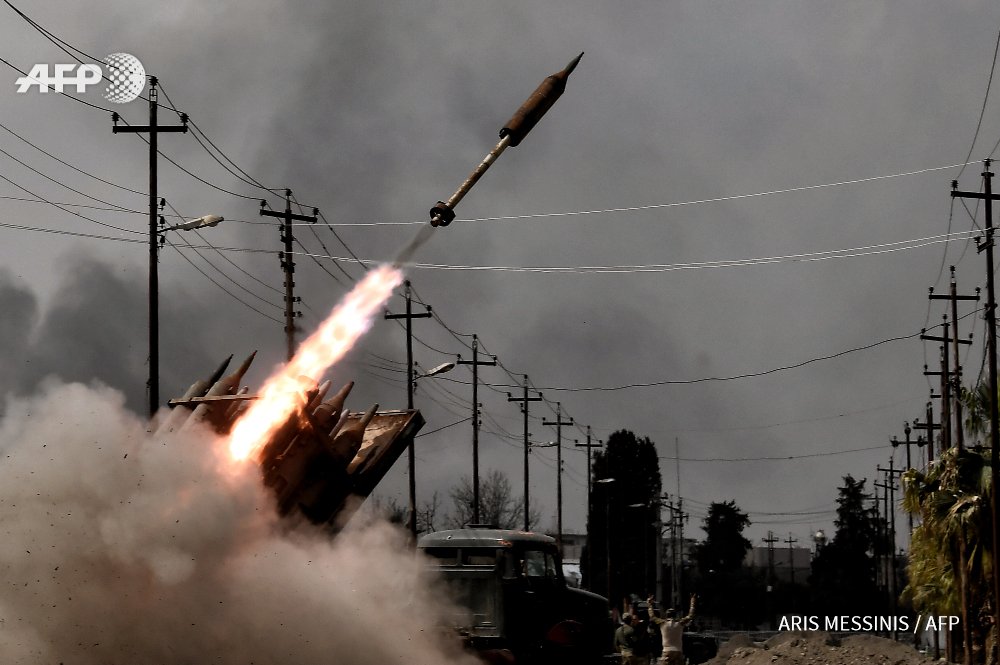A battle with the militants in Mosul, Iraq, March 11, 2017 © Thaier Al-Sudani / Reuters
312
The Mosul siege, supposed to liberate people from ISIS, poses a grave threat to civilians, while those who manage to flee the indiscriminate shelling are forced through a poorly organized jihadist filtering process, a senior HRW official told RT.
Trends#MosulSOS, Iraq carnage, Islamic State
Iraqi troops have been systematically using heavy artillery and crude improvised rocket-assisted munitions (IRAM) in the battle against IS terrorists in Mosul, despite the government’s promises not to use the highly inaccurate weapons in densely populated areas, a new report Human Rights Watch (HRW) revealed earlier this week.
This can potentially be classified as a “war crime” and should be stopped immediately, Ahmed Benchemsi, MENA communications director of HRW told RT.
“The laws of war are very clear, they said whenever there’s a gathering of civilians all necessary measures must be taken to avoid the loss of civilian life. When you are fighting with indiscriminate weapons, as it’ s happening right now in the west Mosul, you’re doing the opposite of that, because you’re firing a rocket and you don’t know where this rocket is going to land,” Benchemsi said.
“And it might very well take many of innocent civilian lives. So, this is what happening right now in west Mosul and it is a blatant violation of the laws of war and possibly a war crime, if it’s going on in a large-scale and a systematic manner.”
Mixed reaction to the usage of such weapons among Iraqi military and civil officials indicates a lack of a uniformed government position on the matter, Benchemsi added.
The use of highly destructive, yet inaccurate munitions, as well as massive airstrikes, leads to heavy infrastructural damage and severe casualties among the civilian population.
IRAQ - Iraqi government forces fire a rocket towards IS group positions in west Mosul.@ArisMessinis #MosulOffensive
At least 3,500 civilians have already been killed since the beginning of the latest offensive, according to estimates of a prominent Iraqi politician Khamis Khanjar.
It’s difficult to either confirm or dismiss such estimates, though, amid the chaos of the lengthy battle.
Those who managed to escape the crossfire say that they suffered both from IS atrocities and the chaotic push to liberate them.
“The airstrike hit it, an army aircraft, and there is nothing left from it. The only things left are ourselves, our family and our clothes. The house is gone, an aircraft hit it,” Mahmoud, a refugee from Mosul, staying in the Chamakor camp for internally displaced people, told RT.
“I know two children from our neighborhood who have been killed. They were killed. I also know a woman who was killed too and her house was damaged. And she was 'damaged' too, so she died, and her two children died too. There are others.”
Refugees are scared, many of them have lost virtually everything.
“How should I not be scared? Our life is messed up. Someone’s house is gone and her husband is gone. Our life is now here [at the IDP camp],” Shaema, another displaced citizen of Mosul, said.
Not all of those who managed to escape the battle even get a chance to get a new “home” at a refugee camp, as Iraqi security forces undertake rigorous measures to prevent IS infiltration and detain all refugees deemed suspicions.
While the screening process is an inevitable measure, its implementation leaves much to be desired. People reportedly go through it in the bare desert and those who were detained end up in centers, in conditions which can only be described as “horrendous,” according to another report released by HRW on Monday.
Detainees lack food, water and even space to breathe, while inadequate medical treatment leads to death and amputations among them, the report revealed. The majority of the detained people are held in overcrowded centers without charges and legal support. Iraqi prisons for IS suspects violate virtually “all the laws pertaining to conditions of detention,” Benchemsi told RT.
“About 1,200 people are held in absolutely horrific conditions in a group of detention centers in Iraq. And those people are accused of being part of ISIS. Fine, they can be checked but not in this way. They should be granted all the guarantees of the fair trial, that any suspected person is guaranteed,” Benchemsi said.
“They should be able to consult lawyers, they should be able to be defendants. And first of all they should not be held in detention centers where they are stuck like sardines, with a very little breathing room and absolutely infect smell and conditions that actually people die from.”
Refugee camps and detention centers will inevitably overflow as the operation to retake western Mosul unfolds. There are still some 700,000 people still trapped in the densely populated western neighborhoods of the city.
Over 4,000 civilians have been fleeing western Mosul daily since Iraqi forces began the operation to retake the IS-held parts of the city on February 19, according to UN estimates.
Almost 100,000 Iraqis have been displaced by the fighting just in the 19 days since February 25, according to the latest estimates by the UN's International Organization for Migration (IOM), while total number of refugees might reach 450,000.


Comments
Post a Comment